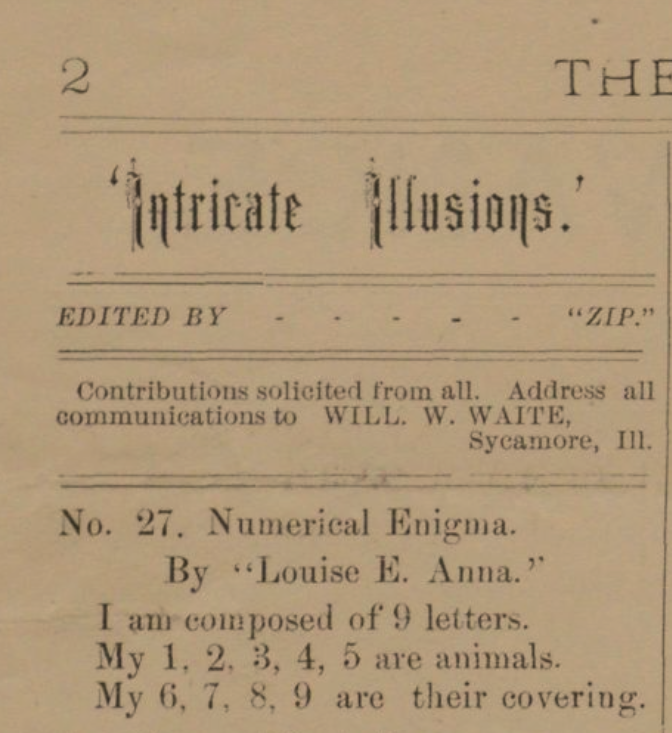 The most recent African American amateur journalist to be rediscovered through the Historic Children's Voices Project is Charles Silas Sauvinet, Jr. (1860-1878). In the January 1879 issue of his paper Le Bijou Cincinnati African American amateur Herbert A. Clark (1857 or 1858-1921) writes a heartfelt obituary of his colleague Louisiana amateur Charles S. Sauvinet, Jr.:
The most recent African American amateur journalist to be rediscovered through the Historic Children's Voices Project is Charles Silas Sauvinet, Jr. (1860-1878). In the January 1879 issue of his paper Le Bijou Cincinnati African American amateur Herbert A. Clark (1857 or 1858-1921) writes a heartfelt obituary of his colleague Louisiana amateur Charles S. Sauvinet, Jr.:
“From New Orleans we learn that Charles S. Sauvinet, Jr., knows to puzzledom as Louise E. Anna, died of yellow fever, during the prevalence of scourge in that afflicted city. Some years since his mother had died and his father’s affection was concentrated on his beloved son, with an intensity that was redoubled by the fact that that son was sinking with a fatal consumption. During a severe attack of the disease, the physician informed the father that his son could not recover. This unmanned the poor father and he resorted to suicide, and Charles, struggling with a fatal disease was left alone in the world. The fearful pestilence came and he too was swept away by the besom of death. A life that opened brightly, was thus sadly closed.”
These few lines allude to the complex physical and emotional challenges suffered by his friend: besides being diagnosed with tuberculosis (frequently a death sentence in its own right), Sauvinet contracted a case of the yellow fever that was ravaging New Orleans in the summer of 1878. His mother already dead, Sauvinet’s father could not bear his son’s dire prognosis and committed suicide July 23, 1878. Young Charles Sauvinet died about two weeks later August 6, 1878.
Biographical sketches of Sauvinet appear in the October 1876 issue of the amateur paper The Southern Meteor (Detroit) and the Oct. 1877 issue of The Nymph. Like many fellow amateurs he wrote not just under one pseudonym but two: “Louise E. Anna” (a play on his home state of Louisiana) and “Laura M. Dickson" (the latter name he used for contributing to the professional paper Boys of the World). He started contributing word puzzles to amateur papers when he was 13 or 14 in 1875. He also contributed to the professional magazines Wide Awake, and the New Orleans New Delta, among others. He is mentioned by his pseudonym “Louise E. Anna” in 20 amateur paper articles between 1877 and 1879. A talented fourteen-year-old junior at Central High School in New Orleans, Sauvinet is described as having won many prizes for solving word puzzles besides authoring many of his own. Click here to view one of his puzzles published in the Jan. 1878 issue of the Amateur Advance (Sycamore, Ill.); bib id 20039, p. 2)
None of these brief biographies or puzzle columns allude to his race; nor does Herbert Clark in his moving eulogy. Likely before news of his death reached the editor, puzzle correspondent “Nora Skin” mentioned in the August 1878 issue of the San Francisco amateur paper Mazy Masker that “a small puzzle-magazine from New Orleans with a ‘Spartan’ and a girl ‘Louise E. Anna’ … is to startle the denizens of the puzzling sphere at some not distant day.” “Spartan” refers to the nom de plume of Sauvinet’s fellow puzzler fourteen-year-old Heiman (later Herman) J. Seiferth (1863-1933), an amateur of white Polish Jewish descent who became a prominent newspaperman working for the New Orleans Picayune. A word puzzle attributed to “Louise E. Anna” was published posthumously in the July 1879 of St. Nicholas magazine.
A database search of the genealogical resource Ancestry reveals that like Herbert Clark, Charles S. Sauvinet, Jr. was of mixed African American and white racial background. Sauvinet was born in New Orleans on December 23, 1861, into a prominent mixed-race family. His father Charles S. Sauvinet, Sr. was the cashier, secretary and later president of the Freedmen’s Savings and Trust Company of New Orleans.
Charles S. Sauvinet enjoyed a national following in both the national and amateur press for his puzzles. He wrote under feminine names, perhaps adding an added layer of protection to his personal identity in an unabashedly racist society. Unlike his colleague of color Herbert Clark, Sauvinet apparently did not attend national or regional amateur press gatherings that would visibly divulge his racial background, although according to the Freedman’s Bank Records (1867), Sauvinet had a white complexion. All the obituaries found in the amateur papers describe him as a talented amateur who sadly died young.